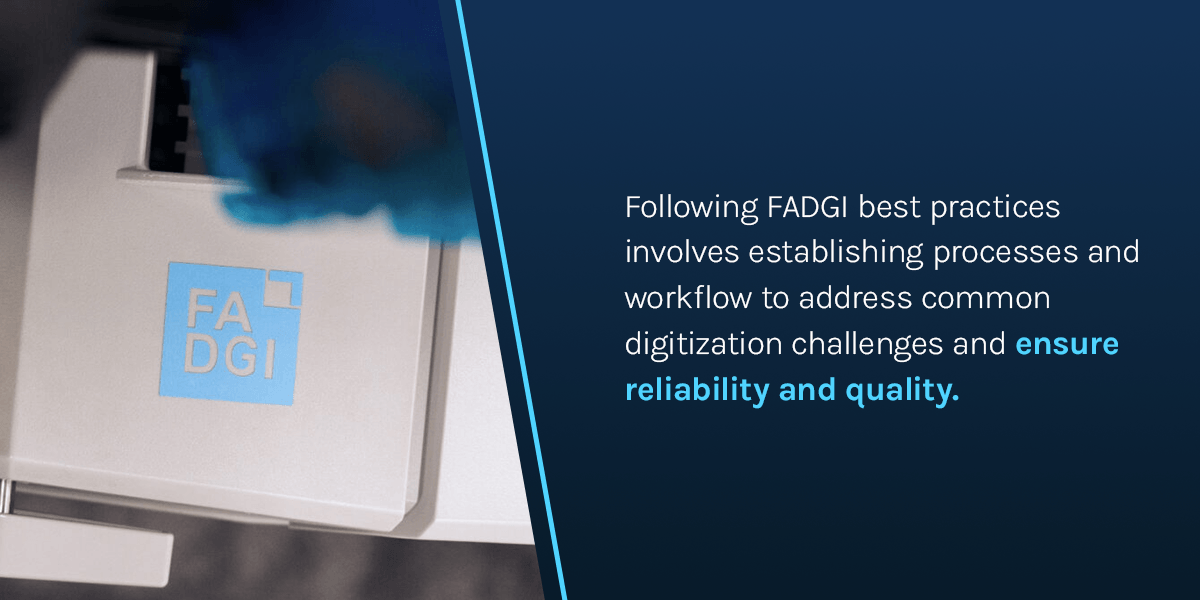Navigating the Regulatory Landscape: Achieving Compliance with FADGI, HIPAA, and GDPR through Document Scanning
5 min read
60-Second Summary
This blog examines how intelligent document scanning systems help BPOs and service bureaus meet complex regulatory requirements, including FADGI, HIPAA, and GDPR. It highlights how secure data capture, audit trails, high-quality imaging, and reduced manual errors enable organizations to streamline compliance, protect sensitive information, and enhance operational efficiency.
Why Compliance Matters More Than Ever in Document Scanning
For document imaging professionals in BPOs and service bureaus, maintaining regulatory compliance has grown increasingly complex. With standards like FADGI, HIPAA, and GDPR defining quality, privacy, and accountability requirements, organizations are under pressure to ensure their document scanning operations can meet stringent audit and data protection demands.
The good news: Intelligent scanning systems are making compliance more accessible. By integrating secure, high-quality image capture with built-in controls for data handling, these solutions reduce the margin for error while increasing transparency and traceability.
This blog outlines how document scanning technologies help organizations navigate regulatory obligations, streamlining workflows and positioning operations for scalable, audit-ready compliance.

Understanding the Regulations
Before diving into how scanning hardware supports compliance, it’s worth revisiting what these regulations require.
FADGI (Federal Agencies Digital Guidelines Initiative): Focuses on image quality and consistency for government records. A three-star rating, for example, mandates high-resolution capture, minimal distortion, and precise tonal reproduction, critical for federal digitization projects.
HIPAA (Health Insurance Portability and Accountability Act): Protects sensitive health information. Covered entities must ensure physical, administrative, and technical safeguards are in place for protected health data, including during scanning and storage.
GDPR (General Data Protection Regulation): Regulates data privacy for EU citizens. It requires that organizations maintain strict controls over how personal data is collected, stored, and processed, including audit trails, access controls, and data minimization.
Each regulation presents unique demands. Combined, they create a complex compliance environment that document imaging workflows must address holistically.
How Document Scanning Meets Compliance Needs
Today’s intelligent document scanning systems are engineered to support compliance in several fundamental ways:
1. Audit-Ready Workflows
- Automated logging ensures complete audit trails, documenting every interaction with a document.
- User access controls and secure authentication help enforce accountability.
- CertainScan® software, for example, tracks user actions and supports digital signatures for tamper-proof auditability.
2. Secure Data Capture
- Documents are scanned directly from the envelope or folder, eliminating unnecessary handling.
- Scanners like Falcon®+ and Gemini® minimize exposure to unauthorized personnel by reducing touchpoints.
- Secure on-site scanning options are ideal for sensitive environments like hospitals, where documents must not leave the premises.
3. Minimal Human Error
- Built-in multi-feed detectors, image verification tools, and auto-classification reduce manual indexing and sorting errors.
- Devices like the Falcon®+ RED™ and Gemini include rescan feeders and real-time image validation to catch anomalies before they enter downstream systems.
4. Compliance with Imaging Standards
- Falcon+ and Falcon+ RED systems with CertainScan meet FADGI three-star specifications when configured appropriately.
- Built-in image validation tools and compatibility with software like Golden Thread™ support compliance verification.
Technology that Supports Compliance
Let’s look at the compliance-supporting features of a few OPEX scanners used in real-world BPO environments:
OPEX Falcon+ RED
- Combines envelope opening, extraction, and scanning into one system
- Supports barcode-driven workflows, audit trails, and advanced image quality controls
- Ideal for environments requiring secure document handling, such as healthcare and government contracts.
OPEX Falcon+
- Offers programmable sort bins and advanced imaging capabilities
- Meets FADGI three-star requirements when running CertainScan with the correct configuration.
- Used by BPOs like An Post Business Solutions and Konica Minolta to streamline archive digitization and reduce compliance risk.
OPEX Gemini
- Right-Speed™ Scanning automatically adjusts to document complexity
- Enables secure scanning of intermixed documents with minimal prep
- Integrates seamlessly with audit logging tools and access controls for HIPAA and GDPR alignment
Compliance Risks of Outdated Scanning Solutions
Relying on outdated scanning hardware can expose your business to serious risks:
Manual Errors: EOlder systems often require extensive prep and sorting, increasing the chance of human error.
Data Breaches: Scanners lacking secure access control and encryption expose sensitive data during capture.
Audit Failures: Without automated tracking and verification tools, proving compliance can be difficult—or impossible—under scrutiny.
Inadequate Image Quality: Low-resolution or inconsistent scans may not meet FADGI specifications, disqualifying projects or resulting in rework.
These gaps can undermine SLAs, increase operational costs, and put contracts at risk.
Best Practices and Takeaways
To maintain compliance across FADGI, HIPAA, and GDPR, BPOs and service bureaus should implement the following:
- Standardize scanning workflows using FADGI-compliant settings where required
- Enforce user authentication and logging through software like CertainScan
- Invest in audit-ready hardware that integrates image quality validation and error detection
- Minimize document prep using scanning systems that handle intermixed sizes and conditions
- Validate compliance regularly using tools like Golden Thread and internal audits
- Educate staff on the regulatory implications of poor data handling practices
Making Compliance Achievable with the Right Scanning Technology
Solutions like the Falcon+ RED, Falcon+, and Gemini help teams stay ahead of compliance demands, ensuring every scanned document is audit-ready, secure, and processed efficiently. By investing in intelligent scanning solutions, organizations can meet evolving regulatory standards without sacrificing speed, accuracy, or operational control.
Ready to simplify compliance? Schedule a demo today and see how our intelligent scanning solutions support FADGI, HIPAA, and GDPR requirements with ease.
Other Resources You Might Find Helpful
San Bernadino County Falcon+ Video
Portsmouth, VA Treasurer’s Office Goes from Cost Center to Revenue Center
NHS Business Services Authority: Rapidly Expanding Patient List Drives Opportunity to Digitize Medical Records
Enhancing the Digitization Process at Iron Mountain Government Solutions
An Post Commerce Business Solutions Implements OPEX® Scanning Technology, Achieving a 33% Increase in
Taking on Wisconsin Department of Transportation DMV’s Digital Transformation
Georgia Department of Revenue Accelerates Processing Times by Automating the Open, Prep, and Scan Process
How Intelligent Scanning Cuts Costs and Drives ROI for BPOs
EXL: Critical Efficiency Improvements in Document Management
Gemini™ Right-Speed Scanner
NEXT LEVEL AUTOMATION
Unlock Operational Efficiency with OPEX
OPEX is powering the future of automation. Contact us to learn more about how our vertically integrated automated solutions can help take your business to new heights.

